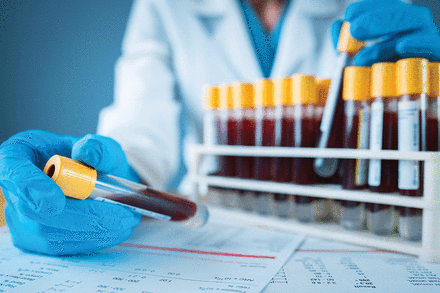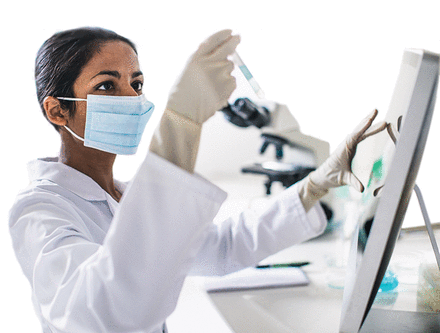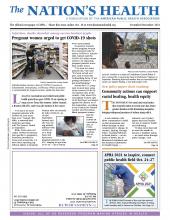
All of Us participants have been surveyed on mental health, physical activity and other issues during the COVID-19 pandemic.
Photo by Nensuria, courtesy iStockphoto
With limited testing in the early days of the COVID-19 outbreak, it was hard to pinpoint exactly when and where the virus first began infecting people in America. But with help from the All of Us Research Program — which is on its way toward building one of the nation’s largest health databases — scientists are getting closer.
Using specimens from All of Us participants, researchers identified evidence of possible COVID-19 infections in a handful of states weeks before they were officially confirmed there. The research, published in June in Clinical Infectious Diseases, suggests COVID-19 was present early on in places that were not considered likely entry points.
The information could help officials better prepare for future disease threats, said study co-author Keri Althoff, PhD, MPH, an associate professor of epidemiology at the Johns Hopkins Bloomberg School of Public Health.
“These epidemics start somewhere, and knowing where they start is really helpful in getting ready for the next one,” Althoff told The Nation’s Health. “All of Us is such a large, highly diverse study. We knew there was a unique contribution that could be made here.”

Data from All of Us participants is being used by scientists.
Photo of woman by Juanmonino, courtesy iStockphoto
The study is one of many ways the All of Us Research Program, led by the National Institutes of Health, is contributing to the science on COVID-19.
Since 2018, more than 400,000 people nationwide have signed up to participate in All of Us, which aims to enroll and follow 1 million people over many years to capture new insights on health and medicine.
When the pandemic began, it quickly became clear the program’s diverse cohort and collection of biological specimens could not only contribute to COVID-19 research, but also help fill in gaps, said Andrea Ramirez, MD, MS, senior advisor to the CEO of the All of Us Research Program.
For example, in the months before the outbreak was declared a national emergency in the U.S., All of Us collected more than 24,000 blood samples from participants. It was those samples that Althoff and colleagues tested for SARS-CoV-2 antibodies to reveal that the novel coronavirus was likely in some states earlier than reported.
After the antibody study made headlines, Ramirez reported that the All of Us program experienced a spike in enrollment.

The All of Us Research Program calls on Americans to voluntarily share their health information to advance and exand science. Data from the 400,000 participants is already providing insights.
Photo by Kate_sept2004, courtesy iStockphoto
“It was definitely an early and large win for the program in terms of meeting an unmet research need,” she told The Nation’s Health.
In addition to antibody testing, All of Us is also collecting a range of information from participants on how the COVID-19 pandemic is impacting their lives. First deployed in May 2020, the COVID-19 Participant Experience Survey — or COPE Survey — has engaged nearly 63,000 All of Us participants. It covers topics such as COVID-19 symptoms, social distancing experiences, financial struggles, resilience, discrimination and mental well-being.
For example, in a survey conducted in July and August 2020, 29% of nearly 30,000 respondents answered “sometimes” when asked how often they felt nervous and stressed in the last month. Thirty percent answered “almost never,” 12% said “fairly often” and 7% said “very often.” Participants also answer questions about social support, physical activity, substance use and loneliness.
This year, Ramirez said the survey added questions about COVID-19 vaccination, which could yield helpful insights on Americans’ attitudes toward vaccines.
“We’re building a dataset that will be useful for years to come,” Ramirez said. “The survey will be a great environment for researchers to come in and replicate what we’re seeing, but also discover how the pandemic is affecting people around the country.”

Blood samples from program participants provided insights on COVID-19 antibodies.
Photo courtesy Busracavus, iStockphoto
Another COVID-19-related project through All of Us involves electronic health records, as more than 200,000 participants have shared their records with the research program. Ramirez said the work involves standardizing record data to make it easier for researchers to study COVID-19, related health problems and treatment.
“We want to make sure the data already being collected can be repurposed and reused for research,” she said.
An expert on longitudinal study design, Althoff was already working with All of Us when the pandemic hit. It was clear right away that the research program — which had just collected tens of thousands of blood samples — could make a unique contribution to understanding the outbreak, she said.
“That’s one of the great benefits of these long studies — they become highly versatile,” Althoff said. “And we needed to use everything we could at the time to learn about this virus.”
To conduct the Clinical Infectious Diseases study, Althoff and colleagues developed a plan to test more than 24,000 All of Us specimens, sending them to the lab in batches of 5,000. Among the specimens tested, which were all collected between Jan. 2 and March 18, 2020, researchers found SARS-CoV-2 antibodies in nine specimens using two different serology tests. Positive samples were detected as early as Jan. 7, 2020, for people in Illinois, Massachusetts, Mississippi, Pennsylvania and Wisconsin.
Althoff said the findings help corroborate other research based on blood bank donations that also show COVID-19 likely arrived in the U.S. earlier than previously thought.
“It’s an incredible national resource,” Althoff said of All of Us. “There’s still no hard and fast conclusions about when exactly the virus came here, but trying to uncover that is important work to do as we prepare for the next pandemic.”

Photo by Sanjeri, courtesy iStockphoto
For more on All of Us and COVID-19 research, visit www.joinallofus.org/coronavirus.
- Copyright The Nation’s Health, American Public Health Association









